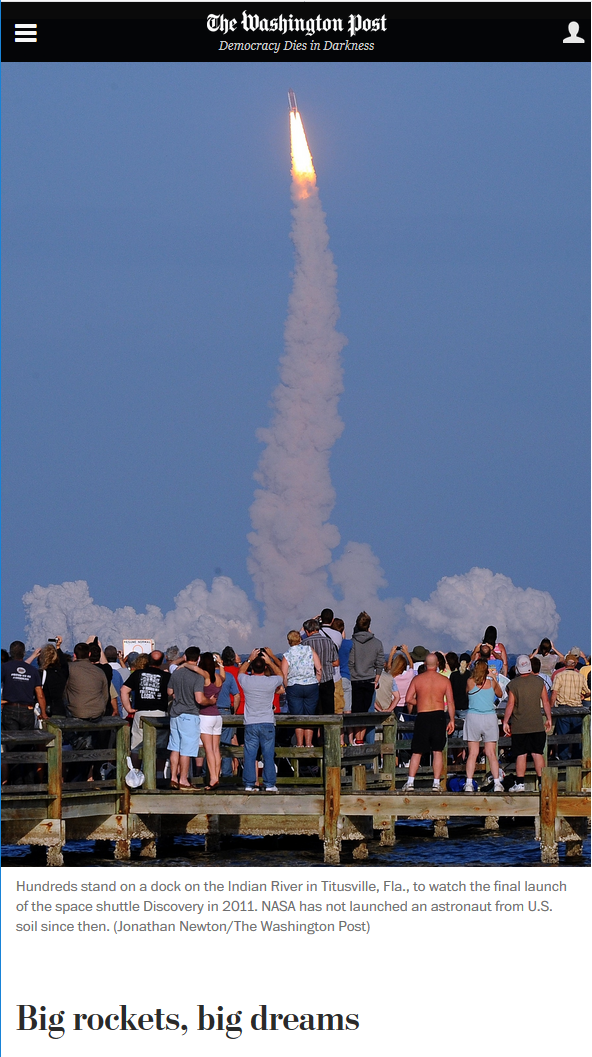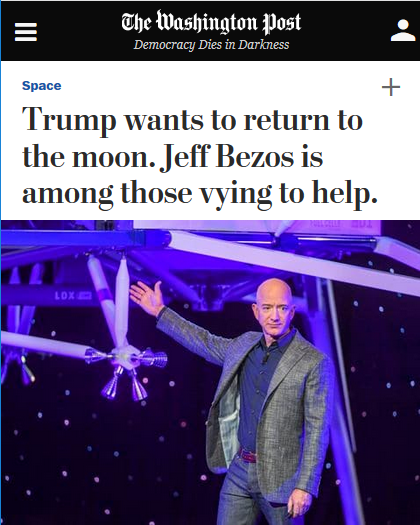 |
WaPo Hypes ‘Space Capitalists’—One of Whom Owns the Paper
view post on FAIR.org
by Julianne Tveten

The Washington Post (5/16/19) touts “the birthplace of America’s Space Age…bouncing back, fueled by private industry.”
“NASA lost its ability to launch humans from US soil when the space shuttle retired,” read a starry-eyed subhead under “Companies in the Cosmos,” a special section of the Washington Post (9/11/18) dedicated to the business of outer space. “Now, companies and billionaire entrepreneurs are defining a new space age.”
“The birthplace of America’s Space Age fell into decay once the shuttle retired,” another Post article (5/16/19) declared. “Now it’s bouncing back, fueled by private industry.”
Therein lies the premise of the Post’s general coverage of space exploration: Businesses can, must and will shepherd the future of the US’s space-exploration program. By parroting the propaganda of an emergent class of “space capitalists,” the Post extols the virtues of the private sector, its repackaged press releases masquerading as inspirational musings on American scientific progress.
Peppered throughout “Companies in the Cosmos” was a series of paeans to spaceflight firms: Boeing, Elon Musk’s SpaceX, Richard Branson’s Virgin Galactic and Blue Origin. The last of those four, aptly, is owned by Jeff Bezos, the founder of Amazon and owner, since 2013, of the Washington Post. (The Post consistently discloses Bezos’ ownership in articles related to him, though not when the paper discusses the space business more generally.)
The Post couched these profiles in lofty Kennedy-era bromides about human advancement. Shortly after Bezos peddled a Blue Origin Moon lander earlier this month, his newspaper (5/9/19) exulted in his presentation:
He made an emotional case for humanity to expand out into the cosmos, a passion he has held since he was a child and has called the most important work he is doing today.
A profile on Chris Ferguson (7/24/18), a test pilot for Boeing commercial spacecraft, asserted that Boeing seeks to make space “more accessible to civilians,” while a similar proclamation (8/14/18) was made for SpaceX, which allegedly seeks to “make space accessible to large numbers of people.”
The “accessibility” narrative translates to the lucrative prospect of space tourism—which the Post depicts as an unstoppable innovation. In 2017, the Post (12/15/17) published Blue Origin’s “released footage” from inside a Texas crew capsule it planned to use to launch tourists into space. Last summer, the Post (8/14/18 ) invited readers to take an “inside view” of a SpaceX rocket factory intended to send private citizens into space; whimsically, the paper likened it to Willy Wonka’s factory, touting its “sleek” spacesuits and the enthusiasm of NASA astronauts “decked out in matching SpaceX T-shirts.”
That spaceflight tickets are projected to cost $200,000 to $300,000 might discredit any notion of “accessibility”; the Post, however, countered this with a bizarre op-ed (9/18/18) claiming space will be accessible to all of us, eventually, because a wealthy art collector might board one of its rockets in 2023.

If you want your sales pitch for a Moon rocket to be written up as a news article in the Washington Post (5/9/19), it helps to own the Washington Post.
Just as it insists companies are breaching new frontiers, the Post also uncritically republishes Bezos’ glib professions that a space industry would “benefit Earth.” Bezos aspires to what’s essentially cosmic imperialism—that is, colonization and resource extraction of interplanetary bodies. “The Earth’s resources are limited, while the population and its appetite for energy, continue to grow,” the Post(5/9/19) stated this month.
The newspaper made no mention of what ecological effects Bezos’ and other companies have already had on Earth and may have on space; instead, it offered a pretext for Blue Origin and other firms to “exploit the limitless resources” in space, as humans, according to Bezos, inevitably move away from Earth. Bezos’ first target: The Moon, whose ice could be turned into rocket fuel.
Bezos’ interest in profiting from the “oil of the solar system,” as capitalists have long described the Moon’s water, comes at a fortuitous time for commercial space travel. The US Commercial Space Launch Competitiveness Act, or SPACE Act, of 2015 gives companies rights to the non-living resources they extract from space, including water and minerals. Upon the legislation’s passage, the Post(5/22/15) again framed a shift toward a billionaire-controlled solar system as a predestined good, declaring, “The future is here.”
The Post’s coverage also celebrates a third goal of commercial space travel: military contracts. Last fall, the paper (9/27/18) repurposed a press release from United Launch Alliance (ULA), a government spacecraft contractor formed by Lockheed Martin and Boeing, announcing ULA’s use of a Blue Origin rocket engine. Calling Lockheed and Boeing “stalwarts in the national security launch business,” the Post welcomed the “new line of business” for Blue Origin, which already had plans for military launches–or, in Post -speak, “national security launches.” Shortly after, the US Air Force announced a $500 million deal with Blue Origin.
While the Post offers occasional criticism, most of its skepticism relates to mechanical safety. Several articles alert readers to failures and potential safety risks posed by companies such as Virgin Galactic, whose spacecraft crashed during a test flight in the Mojave Desert in 2014, and SpaceX, two of whose rockets have exploded. Even then, the Post frames these fatal events as the cost of doing business, “setbacks” from which to recover. Its omission of other criticism—the environmental costs of space exploration, the private ownership of space resources, the expansion of US military aggression (FAIR.org, 5/17/19 ) and the exploitative notion of celestial manifest destiny, to name just a few—is a clear indication of where the paper’s allegiances lie.
The goal of lustrous press for the titans of the “space industry” is to convince the public that spaceflight—as a budding “industry” spearheaded by the ruling class that transports the wealthy, extracts resources from astronomical bodies and bolsters the US military—is unequivocally good. For corporate media, domestically engineered space travel is largely immune to bad press, thanks to its profit potential and position as an arm of American hegemony. And, if the Washington Post’s Boeing advertorials and forthcoming space-race podcast are any gauge, this coverage won’t end any time soon.
|
|
No comments:
Post a Comment